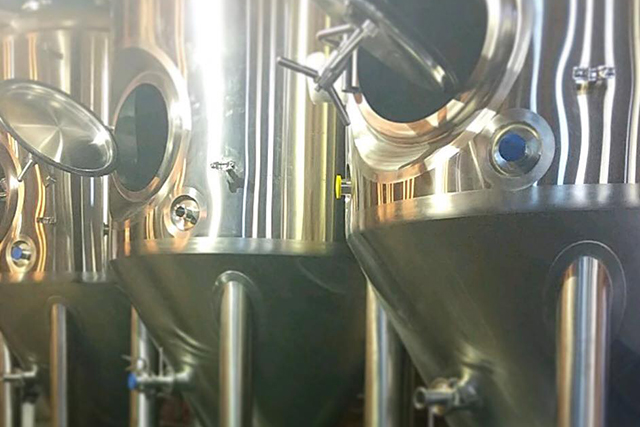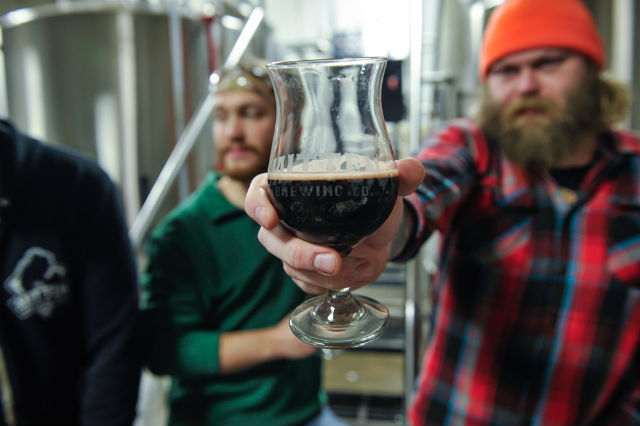
The Craft Beverage Modernization and Tax Reform Act (CBMTRA) (S. TBD) was reintroduced in the U.S. Senate this week with strong support from a broad group of industry trade associations including the beer, wine, spirits, and cider sectors.
The legislation, which was first introduced in 2015 to recalibrate federal excise taxes and streamline regulations on alcohol beverage producers, was reintroduced in 2017 by Senators Ron Wyden (D-OR) and Roy Blunt (R-MO), garnering strong support from the majority of Congress as well as industry groups. Legislation that included a two-year provision of CBMTRA passed in December 2017. Senators Wyden and Blunt are once again the lead co-sponsors of the bill upon its reintroduction today.
Senator Rob Portman (R-OH) wrote and supported an amendment to include the CBMTRA language in the 2017 tax legislation that was signed into law in December of that year. Ohio’s craft breweries have since seen tangible bottom-line savings due to the federal excise tax recalibration, reinvesting those dollars in additional brewery and taproom workers, employee benefits, facility and production capacity expansions, and charitable giving in their communities.
“We thank Senator Portman for co-sponsoring the Craft Beverage Modernization and Tax Reform Act of 2019,” said Mary MacDonald, executive director of the Ohio Craft Brewers Association. “We appreciate his continued support of small and independent brewers and look forward to working with him to pass the legislation and permanently lower the federal excise tax rate.”
“People around the world enjoy Oregon wine, craft beer, cider and spirits—providing not only a serious source of home state pride but also a huge boon to our state’s economy,” Wyden said. “By modernizing burdensome rules and taxes for craft beverage producers, this legislation will level the playing field and allow these innovators to further grow and thrive.”
“The craft beverage industry is driven by small businesses that support thousands of jobs and contribute billions in economic output,” said Blunt. “This bill will remove tax and regulatory barriers that are making it harder for Missouri’s brewers, distillers, and winemakers to grow and compete. I’m encouraged by the strong, bipartisan support this measure had in the previous Congress and look forward to working with our colleagues to get it to the president’s desk.”
Leaders from the Brewers Association (BA), Beer Institute, WineAmerica, Wine Institute, Distilled Spirits Council, American Craft Spirits Association, and U.S. Association of Cider Makers agree that the legislation creates a more fair and equitable tax structure for beverage alcohol producers and their consumers. The legislation empowers these key economic players to continue to invest in their businesses and boost jobs across the country.
“Small and independent craft brewers are grateful for the ongoing bipartisan support for the Craft Beverage Modernization and Tax Reform Act,” said Bob Pease, president and CEO of the Brewers Association. “The legislation is not just economically smart but enables Main Street brewers to do what they do best: create and innovate. Our brewers can be found in every state and employ more than 135,000 Americans. They are at the heart of what makes small businesses so important to the nation’s greater economy. We remain hopeful that this legislation will be made permanent to support the small brewers of today and tomorrow.”
“I want to thank Senators Blunt, Portman, and Wyden as well as numerous members of Congress from both sides of the aisle and across the country for their continued commitment to providing excise tax relief to all of our nation’s brewers and beer importers,” said Jim McGreevy, president and CEO of the Beer Institute. “Since our nation’s inception, brewers and beer importers have been integral to our national fabric. Today, America’s beer industry continues to be a crown jewel in our nation’s manufacturing sector, supporting more than 2.2 million good-paying jobs and pouring more than $350 billion into the national economy. Making federal excise tax relief permanent for our nation’s brewers and importers will enable them to continue to innovate, invest in their businesses, support jobs, and give back to their communities.”
“The American wine industry generates more than $220 billion annually for the American economy through investments, jobs, tourism, and taxes,” said Jim Trezise, president of WineAmerica. “The Craft Beverage Modernization and Tax Reform Act enhanced our industry’s ability to contribute even more by channeling tax savings into purchases of new equipment, additional employees, increased wages, expanded distribution, and facility enlargements. The wine business is highly competitive, capital intensive, and labor intensive, so having extra funds available provides a real boost to our industry’s growth. We are deeply grateful for the original legislation, and respectfully urge that it be made permanent.”
“Without a doubt, CBMTRA is having the intended positive effect on wineries all over the country,” said Bobby Koch, president and CEO of the Wine Institute. “Wineries are using the tax savings to invest in the future growth of their businesses, and in doing so, are supporting their families, their employees, and their communities.”
“The Craft Beverage Modernization and Tax Reform Act marked the first federal excise tax reduction for distilled spirits since the Civil War and enabled distilleries to invest back into their businesses and communities across the United States,” said Distilled Spirits Council CEO Chris Swonger. “Making this legislation permanent would provide stability for distillers in moving forward to generate new jobs and support local agriculture and tourism.”
“Federal excise tax reform has dramatically helped to stimulate craft spirits growth, and a permanent relief is critically important to securing the future of our industry,” added Margie A.S. Lehrman, CEO, American Craft Spirits Association. “As of August 2018, the number of active craft distillers in the U.S. had grown by 15.5% over the last year to nearly 2,000, yet without permanent and immediate reform, the stability of this vibrant industry is bound to be paralyzed. Without the certainty of a long-term reduction, it is impossible for any new or existing distillery to implement a business plan when the wide tax variable threatens the ability to hire new employees, purchase equipment, provide staff benefits, and continue to grow.”
“Regional-brand cider sales increased 22 percent last year, and more than 100 cideries opened their doors for the first time. Hard cider is now produced in 48 states. Much of the cider category’s growth is attributable to the excise tax credits these companies are now receiving,” said Michelle McGrath, executive director, U.S. Association of Cider Makers. “Small cideries are expanding their staff and operations in a direct response. The industry can continue to support manufacturing, neighborhood renewal projects, rural economies, and orchardists, but we need these credits to stick around on a permanent basis to do so. Sunset clauses are no way to plan a business, and cider taxes are extremely complex—uncertainty makes navigating them even more challenging. We’re hopeful to once more see broad bipartisan support for making these credits permanent with the Craft Beverage Modernization and Tax Reform Act. The margins are so tight in cider that many family-owned cideries are literally depending on it.”




1 Trackback / Pingback